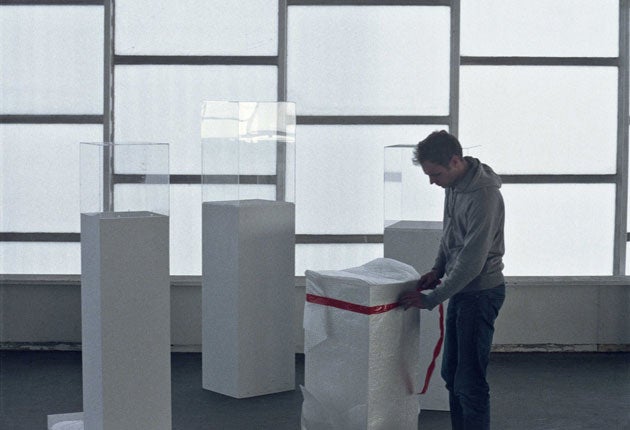Runa Islam, White Cube, London
Turner Prize hopeful loses the plot

By the end of this month, you will have heard a great deal about Dhaka-born film-maker Runa Islam – she is one of four artists in contention for this year's Turner Prize shindig. Meanwhile, here at White Cube in Shoreditch, east London, is a relatively small-scale taster – just three films in all – of what may be to come.
When it comes to films and film-making, Islam is a bit of a pedagogue. She wants to teach you about the processes of film-making, to lay them bare so that you spend a great deal of your time thinking about how films achieve their effects, in what circumstances we enjoy them, and why – in short, how much conditioning of a very particular kind goes into our film buffery and our feverish cinema-going.
At White Cube she's teamed up with a Slovenian artist called Tobias Putrih. Putrih, a fabricator of cinema interiors, has created the elaborate architectural settings within which two of these films are being shown, and he has made a fairly elaborate one within White Cube's main gallery space. And it is here that we sit and muse over a new film called Cinematography.
The side walls of this fabricated auditorium are made from flimsy, curtain-like lengths of film that bow and bend and undulate as we walk past them – rather as a reel of film might do if we were to fling it across the floor. Once inside the space, we sit on circular seats that look a bit like reels of film, too – so it feels a bit as if we are somehow inside a projector, all tangled up in the process of making. All very self-conscious. There is no sound to any of these films, merely the mechanical whirring of old-style projectors. In this case, the projector is behind us – we see it just before we enter the "cinema", high above our heads, on wooden scaffolding.
Now what are Islam's films about? This is where it gets a bit tricky, and where the story line of this review begins to fade away somewhat. Islam isn't particularly strong on story lines precisely because her films are fundamentally fairly self-conscious explorations of the processes of film-making. After all, that's what we are supposed to be attending to. So, in Cinematography the camera is making a very slow interrogation of the inside of a building, slowly exploring the architectural spaces, creeping up its walls and windows like a very slow spider; occasionally, the spider suddenly speeds up, and in order to make us doubly aware of this fact, that speeding-up process is accompanied by a funny zipping noise.
An exhibition is being unpacked, and prepared for showing within this space – we see various red crates standing around; the camera homes in on some detail of an abstract painting. The whole exercise is a deliberately segmented gathering and presentation of visual information – we shift from the shapes of the windows to a snatch of parkland that we can see beyond those windows, and then back to the walls of the building. The camera keeps asking us, how does it all cohere? It is a very slow and rather unexciting visual caress.
Upstairs, Putrih has knocked up another architectural mise-en-scène – this one is more a snatch of a cinema than a cinema entire. In a film called The Restless Subject, we are shown how a primitive cinematic device called a thaumatrope works – when you spin a card with an image on both sides, the human brain begins to merge those two images if the card is spun quickly enough, and we read not two images but a single one in motion – pure, primitive cinema, in short. This is fairly – but only fairly – interesting stuff, and once again it delves into the way in which cinema, from the very beginning, has worked its magic upon its audiences.
But, oh dear, we ache for something a bit more humanly engaging than this business of having to sit at a school desk and listen to lessons through barely stifled yawns.
To 4 October (020-7930 5373)
Join our commenting forum
Join thought-provoking conversations, follow other Independent readers and see their replies
Comments
Bookmark popover
Removed from bookmarks